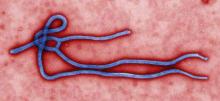President Obama has asked Congress for $6.1 billion in emergency funding to combat Ebola in West Africa and the United States.
The request comes as the World Health Organization reports that through Nov. 2, there have been a total of 13,042 confirmed, probable, and suspected cases of Ebola in eight countries (Guinea, Liberia, Mali, Nigeria, Senegal, Sierra Leone, Spain and the U.S.), and 4,818 deaths.
Although the epidemic appears to be slowing in the initially affected areas of Liberia and Sierra Leone, new cases are popping up in new regions of those countries, Health & Human Services Secretary Sylvia Burwell said during a press conference.
The emergency funding request reflects the importance of getting to those regions quickly, Ms. Burwell said. “We have to put in place the stopping of it right now, this minute.”
The administration is optimistic that Congress will grant the request, White House Office of Management and Budget Director Shaun Donovan said during the press conference. “We’ve heard a real interest in moving this, and moving it quickly.”
Specifically, the White House is seeking $4.6 billion immediately and $1.5 billion in a contingency fund that could be spent on an as-needed basis.
Included in that request is about $69 million to establish an Ebola Virus Disease Treatment Facility in each state plus Washington, New York City, Chicago, Los Angeles, and Puerto Rico. These facilities would serve as the transfer location for Ebola patients. The funds also would be used to purchase personal protective equipment (PPE), train health care workers, retrofit facilities for enhanced isolation, and create point-of-care labs in isolation areas.
The administration is also seeking $85 million to help support overall health system preparedness. The funds would be used by hospitals to buy PPE; provide training and fit-testing for hospitals, emergency medical services and ambulatory care providers; and to run drills. The money would be funneled through the federal Hospital Preparedness Program managed by 62 state and territorial departments of public health.
The Centers for Disease Control and Prevention would get about $1.8 billion of the request, the National Institutes of Health would get $230 million, and the Food and Drug Administration would get $25 million, Ms. Burwell said. Some of the CDC money would go to helping contain the epidemic in West Africa.
In the U.S., the funds for those HHS agencies would be used to help with preparedness, infection control, contact tracing, monitoring, and to developing diagnostics, vaccines, and therapeutics, she added.
Some $2 billion of the $6.1 billion overall would go to the U.S. Agency for International Development and to the State Department to help contain Ebola in West Africa.
The contingency fund would be available for any number of potential needs, Mr. Donovan said. With rapidly changing conditions, “it’s necessary to have maximum flexibility to respond quickly.”
The U.S. response is currently funded in part by the continuing resolution that is keeping the government in operation in absence of an approved federal budget. But that money runs out on Dec. 11, unless Congress acts, Mr. Donovan said. He cautioned that if that funding expires and there is no new continuing resolution or action on the emergency request, the federal government might not have any money to fight Ebola.
The request will first go through the House and Senate appropriations committees. Senate Appropriations Chairman Barbara Mikulski (D-Md.) plans to hold a hearing on the U.S. response to Ebola and the White House request on Nov. 12.
“I commend the President for acting to address this crisis at home and abroad,” Sen. Mikulski said in a statement.
On Twitter @aliciaault

